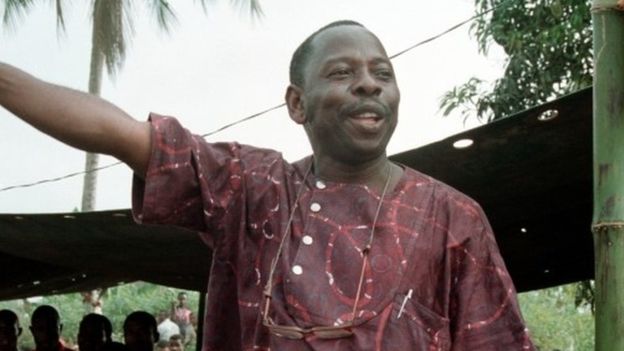If you look at lists of people who should have won a Nobel prize for peace but didn’t, Ken Saro-Wiwa is among the top 5 people. It is a shame he has not yet received Nobel recognition for what he has done for the people in Nigeria. Known as the Gandhi of Nigeria, he was part of the Ogoni people, minority in Nigeria that has been at the center of oil exploration in the country. He has always been honest about his grudges towards the Nigerian government, especially when it came to the displacement of his people and the exploiting of their resources. He formed an organization that aimed to protect the rights of the minority. His activism got his killed, as he was executed by the Nigerian government. He was married, and had five children. His wife and children grew up in the United Kingdom while he remained in Nigeria.
Activism
Ken Saro-Wiva began his activism career in 1990. He devoted his time to human rights and environmental causes, particularly in Nigeria and the Ogoniland. He was one of the early members of the Movement for the Survival of the Ogoni People, advocating for the rights of the Ogoni people. He was one of the people included in writing of the Ogomi Bill of Rights, setting out the movement’s demands including increased autonomy for the Ogoni people. The bill of rights also include fair share of the proceeds of oil extraction, and remediation of environmental damage to the Ogoni Lands.
He was very vocal against the degradation of Ogomi Lands by Royal Dutch Shell. He was imprisoned for several months in 1992. He didn’t get a trial.
Saro-Wiwa was one of the organisers of the MOSOP peaceful march in January 1993. The march featured more than 300,000 Ogoni people, which is more than half of the population. The marches were organized through four Ogoni urban centers. It was those marches that draw international attention. In the same year, the Nigerian government occupied the region with military actions.
The Execution
Ken Saro-Wiwa argued that the oil companies are devastating the region’s environment while bringing no benefit to the 500,000 people living there. He arguaed that Shell turned the area which was unspoiled natural beauty into a grubby black moonscape.
Thanks to his actions, Shell abandoned the Ogoniland in 1993, and has not been back since. The triumph angered the military dictatorship led by General Sani Abacha.
The Nigerian government arrested Saro-Wiwa in 1994, allegedly for being responsible for the death of four Ogoni tribal leaders. He was hanged on November 10, 1995. His death and his character became a symbol for environmental protection and human rights.
Will his death be in vain?
Many years after the death of Saro-Wiwa, it seemed like his death will be in vain. Yes, he managed to get Shell out of the country, but the Ogoniland still looks like the devastated region that spurred him to action. There is little evidence to show that the region sits on one of the world’s largest deposits of oil and gas.
However, things changed in the 2000s. In 2006, for example, the government invited the United Nations Environment Programme to assess the environment and public health impacts of oil contamination in Ogoniland.
The report was delivered in August 2011, and showed that it would take between 25 and 30 years to restore the region. It is the most evidence-based analysis of the situation in Ogoni.
Time will tell whether the process will deliver. However, it is a promising sign that Saro-Wiwa did not die for nothing.
Legacy and quotes
While Ken Saro-Wiwa has not won the Nobel prize, he has got plenty of recognition. For example, a memorial to his actions was unveiled in London in 2006. The Association of Nigerian Authors sponsors the Ken Saro-Wiwa Prize for Prose, and he is named a Writer Hero by the My Hero Project. Amsterdam has a street named after him. With that in mind, here are some of his quotes.
– Lord take my soul, but the struggle continues
– The men we are dealing with are mindless, Stone Age dictators addicted to blood
– In Nigeria, the only wrongdoers are those who do no wrong; to live a day in Nigeria is to die many times
– You cannot destroy an idea like mine…Even if I were to die tomorrow, even if I were to be locked up in prison…You can’t destroy an idea like mine
– It is said that a prophet is not without honor save in his country and in his own house. But I have found honor among my beloved Ogoni people who have suffered immensely in the last hundred years
– The most important thing for me is that I’ve used my talents as a writer to enable the Ogoni people to confront their tormentors. I was not able to do it as a politician or a businessman. My writing did it. And it sure makes me feel good! I’m mentally prepared for the worst, but hopeful for the best. I think I have the moral victory
– I have no doubt at all about the ultimate success of my cause, no matter the trials and tribulations which I and those who believe with me may encounter on our journey. Neither imprisonment nor death can stop our ultimate victory
– Any nation which can do to the weak and disadvantaged what the Nigerian nation has done to the Ogoni, loses a claim to independence and to freedom from outside influence
– Whether I live or die is immaterial. It is enough to know that there are people who commit time, money and energy to fight this one evil among so many others predominating worldwide. If they do not succeed today, they will succeed tomorrow



